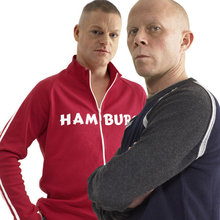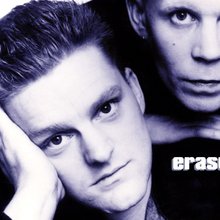Erasure is an English synthpop duo, consisting of songwriter and keyboardist Vince Clarke and singer Andy Bell. The origins of the band's name are unclear. One possible explanation is that in 1985, a technician is believed to have accidentally written “erasure” on a demo tape for “Who Needs Love Like That.” At the time, the duo still hadn't chosen a name for themselves, and when they rescued the tape, they decided upon Erasure.
Vince Clarke was a founding member of Depeche Mode After leaving the band in late-1981, Clarke forged an equally successful career with the duo Yazoo. After two hit albums in as many years, he split with Yazoo partner Alison Moyet and briefly formed The Assembly with producer Eric Radcliffe. Clarke then placed an advertisement in Melody Maker looking for a vocalist for a new musical project. He selected Peterborough-born Andy Bell.
Erasure's first three singles were commercial failures in the U.K. Their debut album, “Wonderland,” was mostly recorded in 1985 and released in June 1986. It was with the release of their fourth single, “Sometimes,” that Erasure finally received recognition in the U.K. in late 1986. The song peaked at #2 and spent many weeks in the U.K. Top 40, marking the beginning of a long string of major hits for the duo.
The single's parent album, “The Circus,” was released in March 1987, reached #6 and turned platinum in the U.K. with three additional hit singles, “It Doesn't Have To Be,” “Victim of Love” and “The Circus.” The album remained on the charts for over a year.
“The Innocents,” was released in April 1988. Preceded by the Top 10 single “Ship of Fools,” the album hit #1 in the U.K. on its initial release and returned to the summit one year later, eventually going triple platinum. It also turned platinum in the U.S., generating two Top 20 hits in “Chains of Love” and “A Little Respect.”
“The Innocents” was the first of five consecutive #1 albums for Erasure in the U.K., including the greatest hits compilation “Pop! The First 20 Hits.” In November 1988, the “Crackers Internationa”l EP, led by the song “Stop!,” hit #2 on the U.K. Singles chart. The albums “Wild!” from 1989 and “Chorus” from 1991 both contained four Top 20 singles and were major sellers.
“Crackers International” was bettered in 1992 by another EP, “Abba-esque, “covering four ABBA hits, which became Erasure's first (and to date only) #1 on the U.K. Singles chart.
In 1994, Erasure released “I Say I Say I Say,” their fifth consecutive #1 on the U.K. Albums Chart. Its first single, “Always,” became the band's third Top 20 hit in the United States and became their last U.K. Top 5 hit until 2005.
The October 1995 release of the album “Erasure” marked a determined shift away from Erasure's signature three-minute synthpop to a more introspective and experimental sound. Nevertheless, it made the U.K. Top 15 and spawned two U.K. Top 20 singles, “Stay With Me” and “Fingers & Thumbs.”
In spite of a return to three-minute pop songs, the 1997 album “Cowboy” did not restore the success of their 1986-1994 era. “Cowboy” enjoyed a short-lived success, peaking at #10 in the U.K. but lasting only two weeks in the U.K. Top 40.
In October 2000, Erasure released their ninth studio album “Loveboat,” co-produced with Flood, though only peaking at a lowly #45. Only one single was released, “Freedom,” which made a brief entry into the U.K. Top 30.
The 2003 release “Other People's Songs” was a collection of cover versions. Its first single, a cover of Peter Gabriel's song “Solsbury Hill,” reached the U.K. Top 10. The second single from the album was a cover of Steve Harley's “Make Me Smile (Come Up and See Me)” which made #14 on the charts.
Erasure's 2005 album “Nightbird's” first single, “Breathe,” reached #4 on the U.K. charts (their first Top 5 hit in more than a decade) and achieved the #1 spot on the U.S. Billboard Dance Chart, 18 years after their first chart-topper.
The next single, “Don't Say You Love Me,” which made the U.K. Top 15, enabled purchasers to configure their own remixes of the single through the band's website, with each variant of the song limited to a single download.
“Union Street” was a 2006 side-project which featured a collection of previously released album tracks that the band reinterpreted in an acoustic/country & western style. The album was named after the recording studio in Brooklyn where it was recorded.
The duo then released a more dance-oriented album than some of their more recent work. Titled “Light at the End of the World,” the album was produced by Gareth Jones and was released in May 2007. The album was preceded by its first single “I Could Fall in Love with You,” which marginally missed the U.K. Top 20.
“Total Pop! - the First 40 Hits,” a collection of Erasure's first 40 hits plus a new remix of “Always” by Jeremy Wheatley, was released in February 2009. The compilation fractionally missed the U.K. Top 20, reaching #21.
A new studio album, “Tomorrow's World,” was released in October 2011. The first single from the album was “When I Start To (Break It All Down)” and debuted on the U.K. Singles chart at #172.
Erasure played a 27-date US and Canada tour, as well as at Estadio Monumental in Lima, Peru on 18 August. The Tomorrow's World Tour began on 31 August 2011 in Tampa, continuing through September, and finished in Seattle on 6 October 2011. The UK and European leg of the Tomorrow's World tour began on 12 October 2011 in Leicester, UK, continuing through to 14 November 2011 in Dresden, Germany.
On 20 June 2011, it was confirmed via their official website that ther most recent studio album is called Tomorrow's World. This album was released on 3 October 2011 (11 October 2011 in the US). The first single from the album was "When I Start To (Break It All Down)". The album reached number 29 in the UK, number 35 in Germany and number 61 in the US. The second single from Tomorrow's World was "Be with You", which peaked in the top 10 on the US Hot Dance Club Songs, making it their highest peak since "Breathe" in 2005. The third and final single from the album was "Fill Us with Fire" which was released 12 March 2012.
Erasure also toured internationally in 2011; it was one of their longest tours and included visits to some places for the first time, including Russia and Ukraine. They also did a whole South American Tour, including two shows in Buenos Aires, where they last performed in 1997 during the Cowboy Tour.
On 11 November 2013, Erasure released their first holiday album, Snow Globe. The first single from the album was a cover of the 1973 Steeleye Span track "Gaudete" which is available as a digital download since the 28 October, in advance of the single's full release as a CD and download bundle on 9 December. The track was available in the US on 29 October.
Discography
Wonderland (1986)
The Circus (1987)
The Innocents (1988)
Wild! (1989)
Chorus (1991)
I Say I Say I Say (1994)
Erasure (1995)
Cowboy (1997)
Loveboat (2000)
Other People's Songs (2003)
Nightbird (2005)
Union Street (2006)
Light at the End of the World (2007)
Tomorrow's World (2011)
Snow Globe (2013)

